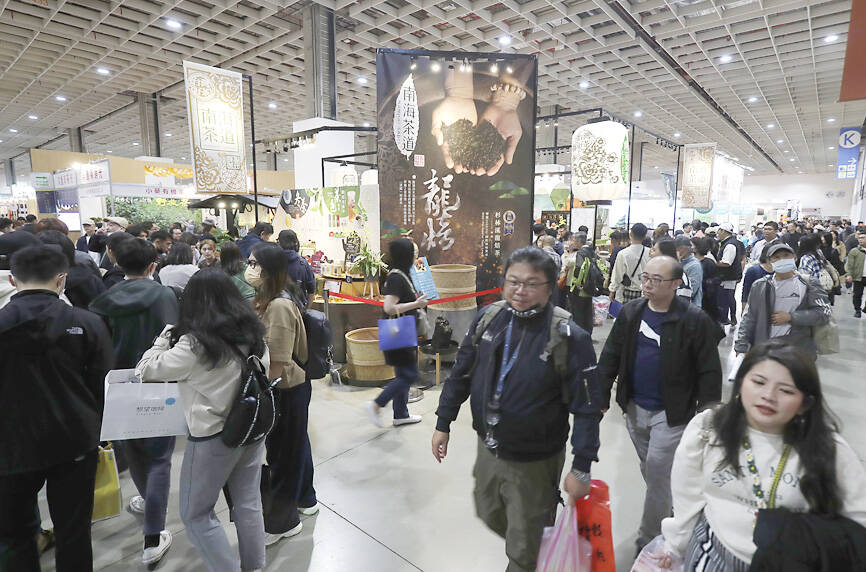Taiwanese this month are turned less confident about GDP growth and slightly more conservative about purchases of durable goods and big-ticket items, although economic data displayed signs of improvement, a Cathay Financial Holding Co (國泰金控) survey released yesterday found.
A total of 38.7 percent of the respondents expect the nation’s economy to deteriorate in the coming six months, while 29.5 percent believe it would improve, it said after polling 14,287 people online from Nov. 1 to 7.
Despite the results, the government’s business climate monitor last month turned “yellow-blue,” indicating that the economy is shifting gears toward a better state following 10 months of recession caused by a global trade slowdown.

Photo: AP
Only 21 percent of survey respondents still believe GDP growth this year would exceed 2 percent, higher than the Directorate-General of Budget, Accounting and Statistics’ August projection at 1.61 percent. The statistics agency is likely to trim its growth forecast on Nov. 28 after major economic gauges disappointed.
At the same time, 84 percent of the public expect inflation of more than 2 percent, meaning consumer price hikes would eat away the limited benefits of economic growth.
The inflationary measure last month accelerated faster than 3 percent on the back of rising fruit and vegetable prices amid supply disruptions.
Labor officials in September announced plans to raise basic wages next year by 4 percent from NT$26,400 to NT$27,470 a month to help ease the pains of inflation, but firms are not obligated to make adjustments for workers who earn more than the basic wage.
Still, 24.2 percent said their wages would pick up in the coming six months, higher than the 16.4 percent who hold the opposite view, while 59.4 percent said their wage would remain unchanged.
Against this backdrop, 34.3 percent would cut spending on durable goods, while 18.9 percent would increase their budget, the survey said. By contrast, 31 percent expressed more interest in buying big-ticket items and 24 percent would tighten their belts, it said.
Further, 65.7 percent believed it to be unwise to buy houses and 46.9 percent also think it is ill-conceived to sell. However, 33.3 percent indicated that it is time to sell, which might translate into selling pressure, it said.
As for stock investments, 32.3 percent expect TAIEX to advance and 32.6 percent expect the local bourse to fall, it said.
Despite the mixed sentiment, 28.4 percent intend to channel cash into stock investments and 18.1 percent prefer to lower holdings, it said.

Semiconductor business between Taiwan and the US is a “win-win” model for both sides given the high level of complementarity, the government said yesterday responding to tariff threats from US President Donald Trump. Home to the world’s largest contract chipmaker, Taiwan Semiconductor Manufacturing Co (TSMC, 台積電), Taiwan is a key link in the global technology supply chain for companies such as Apple Inc and Nvidia Corp. Trump said on Monday he plans to impose tariffs on imported chips, pharmaceuticals and steel in an effort to get the producers to make them in the US. “Taiwan and the US semiconductor and other technology industries

SMALL AND EFFICIENT: The Chinese AI app’s initial success has spurred worries in the US that its tech giants’ massive AI spending needs re-evaluation, a market strategist said Chinese artificial intelligence (AI) start-up DeepSeek’s (深度求索) eponymous AI assistant rocketed to the top of Apple Inc’s iPhone download charts, stirring doubts in Silicon Valley about the strength of the US’ technological dominance. The app’s underlying AI model is widely seen as competitive with OpenAI and Meta Platforms Inc’s latest. Its claim that it cost much less to train and develop triggered share moves across Asia’s supply chain. Chinese tech firms linked to DeepSeek, such as Iflytek Co (科大訊飛), surged yesterday, while chipmaking tool makers like Advantest Corp slumped on the potential threat to demand for Nvidia Corp’s AI accelerators. US stock

The US Federal Reserve is expected to announce a pause in rate cuts on Wednesday, as policymakers look to continue tackling inflation under close and vocal scrutiny from US President Donald Trump. The Fed cut its key lending rate by a full percentage point in the final four months of last year and indicated it would move more cautiously going forward amid an uptick in inflation away from its long-term target of 2 percent. “I think they will do nothing, and I think they should do nothing,” Federal Reserve Bank of St Louis former president Jim Bullard said. “I think the

SUBSIDIES: The nominee for commerce secretary indicated the Trump administration wants to put its stamp on the plan, but not unravel it entirely US President Donald Trump’s pick to lead the agency in charge of a US$52 billion semiconductor subsidy program declined to give it unqualified support, raising questions about the disbursement of funds to companies like Intel Corp and Taiwan Semiconductor Manufacturing Co (台積電). “I can’t say that I can honor something I haven’t read,” Howard Lutnick, Trump’s nominee for commerce secretary, said of the binding CHIPS and Science Act awards in a confirmation hearing on Wednesday. “To the extent monies have been disbursed, I would commit to rigorously enforcing documents that have been signed by those companies to make sure we get